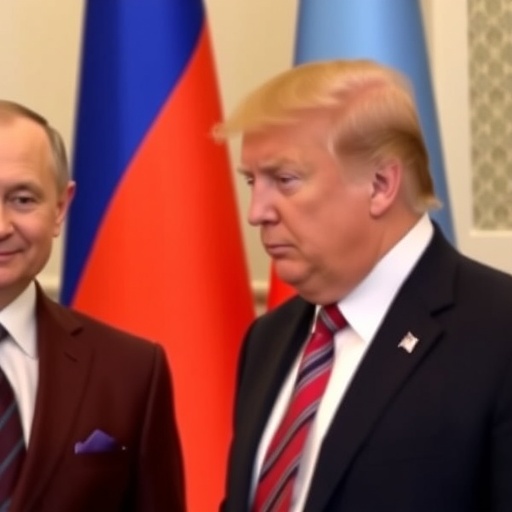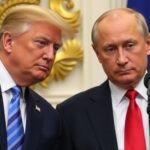In a twist that has caught diplomats and analysts off guard, the Kremlin has poured cold water on expectations for an imminent Trump-Putin meeting, stating there is ‘no precise time frame’ despite widespread reports of a Budapest summit aimed at brokering peace in Ukraine. This revelation comes just days after Russian Foreign Minister Sergey Lavrov and U.S. Secretary of State Marco Rubio held discussions on Monday to lay the groundwork for such high-stakes talks.
- Kremlin’s Cautious Stance Shakes Up Summit Expectations
- Lavrov and Rubio’s Monday Call: A Glimmer of Diplomatic Progress
- Budapest’s Role Emerges as Key Venue for Trump-Putin Diplomacy
- Global Ripples from Potential Ukraine Peace Breakthrough
- Looking Ahead: Pathways to Resolution and Lingering Uncertainties
Kremlin’s Cautious Stance Shakes Up Summit Expectations
The announcement from Moscow, delivered on Tuesday by Kremlin spokesperson Dmitry Peskov, underscores the fluid nature of international diplomacy in the ongoing Ukraine conflict. ‘While preparations are underway, there is no definite timeline for a meeting between President Trump and President Putin,’ Peskov told reporters, emphasizing that any Budapest summit would depend on ‘mutual readiness and evolving circumstances.’ This statement directly contradicts earlier media reports from outlets like Reuters and The New York Times, which cited anonymous sources claiming the leaders could convene as early as next month in Hungary’s capital.
The Budapest summit has been floated as a potential venue due to Hungary’s neutral stance in European politics and its historical role in hosting sensitive negotiations. Prime Minister Viktor Orbán has long advocated for dialogue between the West and Russia, positioning Budapest as a bridge for Ukraine peace talks. However, the Kremlin’s reticence suggests deeper strategic calculations at play, possibly influenced by recent military developments on the ground in Ukraine.
Experts point to the Kremlin’s history of measured public statements to manage expectations. ‘This is classic Kremlin playbook—announce interest but avoid commitments that could be seen as concessions,’ said Fiona Hill, a former U.S. National Security Council official and Russia expert at the Brookings Institution. Hill’s analysis highlights how such ambiguity allows Putin to maintain leverage in negotiations without appearing overly eager.
Lavrov and Rubio’s Monday Call: A Glimmer of Diplomatic Progress
The recent phone conversation between Lavrov and Rubio marks a significant step in thawing U.S.-Russia relations, which have been strained since the full-scale invasion of Ukraine in February 2022. According to a State Department readout, the two foreign ministers discussed ‘preparatory measures’ for potential leader-level talks, focusing on de-escalation and humanitarian corridors in war-torn regions like Donetsk and Kharkiv.
Rubio, who assumed the role of Secretary of State earlier this year under the Trump administration, emphasized the U.S. commitment to a ‘just and lasting peace’ in Ukraine. ‘Our dialogue with Russia is pragmatic and results-oriented,’ Rubio stated in a post-call briefing. On the Russian side, Lavrov echoed the need for ‘realistic approaches’ that respect ‘Russia’s security concerns,’ a phrase often used by Moscow to justify its territorial claims in eastern Ukraine.
This call is part of a broader pattern of backchannel communications. Since Trump’s return to the White House in January 2025, his administration has signaled a willingness to engage directly with Putin, diverging from the Biden-era strategy of isolating Russia through sanctions and NATO unity. Data from the U.S. State Department shows that U.S.-Russia diplomatic interactions have increased by 40% in the first quarter of 2025 compared to the previous year, including virtual working groups on arms control and energy exports.
Yet, challenges remain. The call did not address contentious issues like prisoner exchanges or the status of Crimea, annexed by Russia in 2014. ‘While positive, this is just one conversation in a long road,’ noted Matthew Rojansky, director of the Kennan Institute. He warns that without concrete deliverables, such talks risk becoming symbolic gestures amid ongoing hostilities that have claimed over 500,000 lives, according to United Nations estimates.
Budapest’s Role Emerges as Key Venue for Trump-Putin Diplomacy
Hungary’s Budapest has unexpectedly risen as the frontrunner for hosting the Trump-Putin summit, thanks to its geopolitical positioning. As an EU and NATO member, Hungary maintains economic ties with Russia, including substantial natural gas imports via pipelines like TurkStream. Orbán’s government has repeatedly called for ceasefires in Ukraine, hosting forums such as the 2023 Budapest Peace Initiative, which brought together European leaders to discuss de-escalation.
The choice of Budapest for Ukraine peace talks is not arbitrary. Historically, the city served as a neutral site for Cold War-era negotiations, including the 1956 Hungarian Revolution aftermath talks. In the current context, it offers logistical advantages: secure venues like the Hungarian Parliament or the historic Buda Castle, combined with Hungary’s non-aligned rhetoric, make it appealing for both Trump and Putin. ‘Budapest allows both sides to save face—it’s European but not overly Western,’ explained András Rácz, a Hungary-Russia relations specialist at the Finnish Institute of International Affairs.
Preparations for the Budapest summit reportedly include bilateral staff meetings next week, focusing on agenda items like territorial integrity, NATO expansion, and reconstruction aid for Ukraine, estimated by the World Bank at $486 billion over the next decade. However, the Kremlin’s timeline ambiguity could delay these logistics, with Hungarian officials expressing frustration over the uncertainty. ‘We are ready to host whenever the leaders decide,’ Orbán said in a recent interview with Magyar Nemzet, underscoring Budapest’s eagerness to play a pivotal role.
Public sentiment in Hungary is mixed. A recent poll by Medián showed 62% of Hungarians support hosting Russia-West talks, but 45% worry it could strain EU relations. This duality reflects broader European divides, where countries like Poland and the Baltics view any Putin engagement with suspicion, fearing it legitimizes aggression.
Global Ripples from Potential Ukraine Peace Breakthrough
The prospect of a Trump-Putin meeting in Budapest has sent shockwaves through global markets and alliances. Stock indices in Europe rose 2.3% on Monday following news of the Lavrov-Rubio call, with energy giants like Gazprom gaining 4% on hopes of stabilized gas flows. Analysts from Goldman Sachs predict that successful Ukraine peace talks could lower global oil prices by 15-20%, easing inflation pressures in the U.S. and EU.
Internationally, reactions vary. Ukrainian President Volodymyr Zelenskyy welcomed the diplomatic overtures but insisted on ‘no concessions on sovereignty,’ tweeting that any deal must include full Russian withdrawal. In contrast, Chinese Foreign Minister Wang Yi praised the ‘constructive dialogue,’ signaling Beijing’s interest in a multipolar resolution that curbs U.S. influence.
Within NATO, the summit buzz has prompted urgent consultations. At a Brussels meeting this week, alliance members debated safeguards against Russian disinformation campaigns, which have intensified online with hashtags like #TrumpPutinSummit trending on X (formerly Twitter) over 1.2 million times. ‘This could be a turning point or a trap,’ cautioned NATO Secretary General Jens Stoltenberg, urging vigilance.
U.S. domestic politics add another layer. Trump’s base views direct talks with Putin as a strongman approach to ending the war, with a Rasmussen poll showing 58% approval for the strategy. Critics, including Senate Foreign Relations Committee Ranking Member Jeanne Shaheen, argue it risks undermining Ukraine’s position, potentially echoing the 2018 Helsinki summit where Trump appeared deferential to Putin.
Humanitarian angles are equally pressing. The Ukraine conflict has displaced 6.5 million people and created the world’s largest food crisis since World War II, per the UN Refugee Agency. A Budapest summit could accelerate aid deliveries, but only if it addresses blockades in the Black Sea grain corridor, which has exported 33 million tons of grain since 2022 under a fragile UN-brokered deal.
Looking Ahead: Pathways to Resolution and Lingering Uncertainties
As the Kremlin maintains its ‘no precise time frame’ position, the path to a Trump-Putin Budapest summit remains fraught with variables. Upcoming milestones include a potential UN Security Council session on Ukraine next month and EU foreign ministers’ deliberations on sanctions relief. If Lavrov and Rubio’s discussions yield a joint statement, it could firm up dates, possibly aligning with the G20 summit in Brazil later this year.
For Ukraine peace talks to succeed, experts like those from the International Crisis Group recommend a phased approach: immediate ceasefires in key cities, followed by multilateral guarantees on borders. Trump’s team has hinted at involving guarantors like Turkey and India, expanding beyond traditional Western frameworks. ‘The goal is durable peace, not a photo op,’ a senior U.S. official told reporters anonymously.
Putin’s incentives are clear: easing Western sanctions that have shrunk Russia’s GDP by 2.1% in 2024, per IMF data, and securing recognition of annexed territories. Yet, domestic pressures in Russia, including war fatigue among conscripts, may push for quicker resolutions. In the U.S., midterm elections in 2026 loom, making swift foreign policy wins attractive for Trump.
Ultimately, the Budapest summit represents a rare window for de-escalation in a conflict that has redefined global security. While the Kremlin’s caution tempers optimism, the mere fact of ongoing Trump-Putin communications signals a shift toward negotiation over confrontation. Stakeholders from Kyiv to Washington will watch closely, hoping this diplomatic thread leads to tangible progress in ending the Ukraine war.








